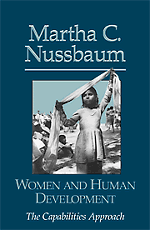CHAPTER ONE - IN DEFENSE OF UNIVERSAL VALUES
Published online by Cambridge University Press: 05 June 2012
Summary
I found myself beautiful as a free human mind.
Mrinal, in Rabindranath Tagore's “Letter from a Wife”It is obvious that the human eye gratifies itself in a way different from the crude, non-human eye; the human ear different from the crude ear, etc. … The sense caught up in crude practical need has only a Restricted sense. For the starving man, it is not the human form of food that exists, but only its abstract being as food; it could just as well be there in its crudest form, and it would be impossible to say wherein this feeding activity differs from that of animals.
Marx, Economic and Philosophical Manuscripts of 1844CHALLENGES TO CROSS-CULTURAL NORMS
An international feminism that is going to have any bite quickly gets involved in making normative recommendations that cross boundaries of culture, nation, religion, race, and class. It will therefore need to find descriptive and normative concepts adequate to that task. I shall argue that certain universal norms of human capability should be central for political purposes in thinking about basic political principles that can provide the underpinning for a set of constitutional guarantees in all nations. I shall also argue that these norms are legitimately used in making comparisons across nations, asking how well they are doing relative to one another in promoting human quality of life.
- Type
- Chapter
- Information
- Women and Human DevelopmentThe Capabilities Approach, pp. 34 - 110Publisher: Cambridge University PressPrint publication year: 2000
- 3
- Cited by



